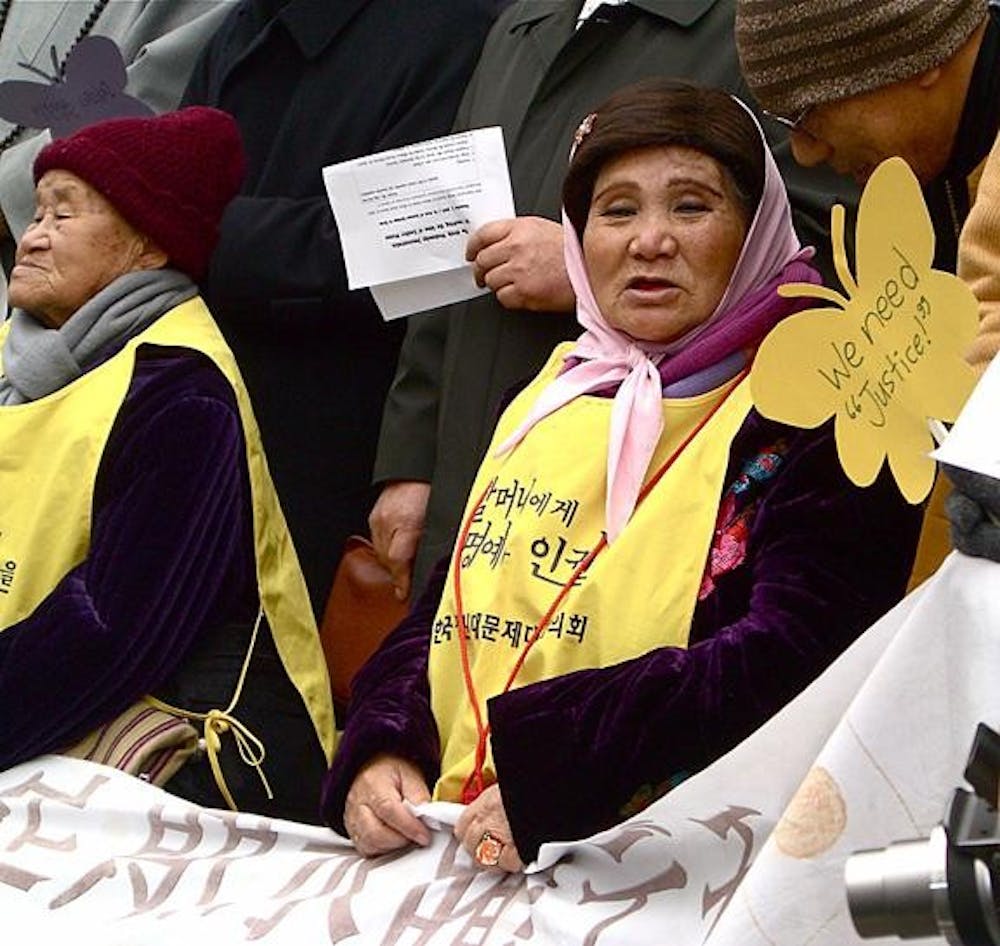“We want justice,” reads the sign of one of the protesters supporting the South Korean “comfort women’s” protest at the Japanese embassy in Seoul, South Korea.
During the Japanese colonial period, when Japan annexed Korea in 1910 until 1945, Japan made quite an impression on the country.
Although Japan helped develop some of Korea’s foundational institutions such as railways, bridges and educational systems, there were many Koreans who suffered from harsh Japanese rule.
Among those that suffered were many young women who were forced to sexually serve Japanese military men during World War II.
Women from ages nine to 29 were kidnapped, lured or promised good-paying jobs only to find out they were tricked into sexual slavery.
It is estimated that there were about 200,000 to 300,000 women who served as Japanese military sex slaves, the majority of these women being from Korea.
Many would be taken to Japanese military stations and given a “comfort station,” a small cubicle with a mat, where they would be forced to service Japanese military men.
There have been accounts where a “comfort woman” would be raped by more than 30 men a day.
If they refused service, they would be beaten. Many survivors have scars of cuts and cigarette burns on their body. Because of constant beatings and forced abortions, most “comfort women” could no longer bear children.
For almost 50 years the “comfort women” remained silent, ashamed, embarrassed or scarred by their past. During the early 1990s, women slowly started to come out and tell the public their stories, realizing they were victims.
Since Jan. 8, 1992, a small group of young Korean and Japanese protesters, former “comfort women,” Buddhist monks, Christian nuns and anyone who wants to support their cause, gathers every Wednesday to protest outside the Japanese embassy in Seoul.
The Japanese government has refused to take legal responsibility for having created an institutionalized, systematic gathering of “comfort women” and the use of “comfort stations.” This implies that the women were legal prostitutes working to send money back home to their families.
However, these women did not do it voluntarily; they were victims of rape and violence. This is one of the main reasons why the women protest.
They have seven main demands from the Japanese government: to admit the drafting of military “comfort women,” apologize officially, tell the truth about the war crimes, build memorials for the victims in Japan, pay restitutions to the victims or their
families, teach the truth about the crimes in Japanese textbooks so that they will not be repeated and punish the criminals.
These elderly women come every week in all weather conditions wearing bright yellow to show they are strong and will not give up. They fear that when they die they will be left branded as prostitutes, and their story will be forgotten.
I attended the 894th demonstration at the Japanese embassy.
They have handouts explaining their cause and showing the procedure of their demonstration, which includes moving songs, progress reports, prayers by different faiths and a reading of their statement.
It was very moving and inspiring to see these women fight for their rights.
Watching a former “comfort woman” speak to the crowd and shake her fists at the Japanese embassy with a struggling yet strong voice brought tears to many eyes.
The activism these women have shown has helped the international community to recognize that any form of sexual violence is an abuse of human rights. They refuse to become a distant memory in the fight for the preservation of human rights.
Scarred past, hopeful Wednesdays

Get stories like this in your inbox
Subscribe



